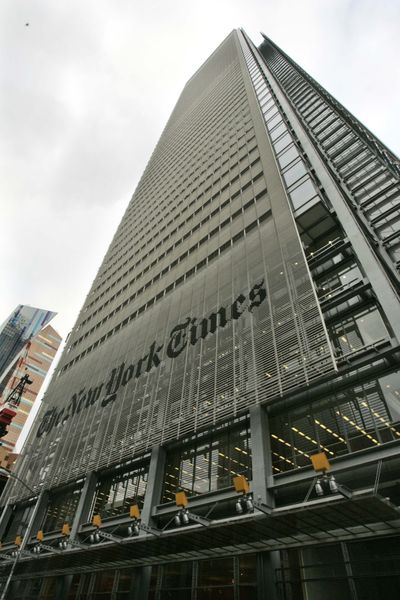Newspaper buildings for sale, but who’s buying?

NEW YORK — With revenue plunging as readers and advertisers flee to the Web, many newspaper companies have turned to selling off their buildings to raise money or save on costs. But now that option may be drying up too, as frozen credit markets make commercial real estate deals scarce.
At least half a dozen newspaper companies have said this year they plan to sell their buildings, some with the intention of leasing back space for their news operations. Others are moving to smaller offices to save money as staffs dwindle and the era of commanding downtown newspaper buildings appears near an end.
The newspapers could hardly have picked a worse time to put their buildings on the block, with the value of commercial real estate deals plummeting from just a year ago.
“Timing is everything,” said Ross Moore, a director at the real estate services firm Colliers International. “If you tried to do a sale-leaseback 18 months ago the deal would have been done before the end of the day. Now, you’ve probably got your work cut out for you.
“The second issue is the newspapers themselves,” he added. “It’s pretty well known that they’re going through a tough time.” Which means buyers know they can hold out for a bargain.
Still, analysts say the list of newspapers looking to leverage their property for capital could grow under the strain of the recession.
Before filing for bankruptcy this month, Tribune Co. was trying to sell the modernist 1935 Los Angeles Times headquarters and the gothic Tribune Tower in Chicago, completed in 1925. The company that owns the Philadelphia Inquirer and Daily News is in the middle of a deal to sell the white tower that houses both newsrooms on Broad Street, the city’s main artery. And Fort Worth Star-Telegram publisher Gary Wortel put the newspaper’s downtown offices up for sale in September.
The New York Times Co. plans to raise $225 million with its brand-new, 52-story Manhattan headquarters, either through a leaseback or a mortgage. The Times owns 58 percent of the building, a portion that has not yet been mortgaged.
The Record of Bergen County, in New Jersey, plans to move its 80 staff members out of their Hackensack headquarters in January. Some will move to smaller offices owned by the newspaper’s parent company, North Jersey Media Holdings, or become remote journalists, working with laptops and cell phones.
Publisher Stephen Borg said the company is still weighing whether to sell the building, or possibly develop the site. “This building is inefficient: We’ve got 80 people sitting on 20 acres,” Borg said.
Erik Kolar, chief executive of Wayne, Pa.-based Patriot Equities LP, said the number of newspapers trying to sell property has ballooned the past year. His company signed a deal for an undisclosed amount in January to acquire the building that houses the Inquirer and Daily News in Philadelphia and lease back the space. Extra room not used by the newspapers will go to other tenants.
Many newspaper companies own what should be attractive real estate in major metropolitan areas. The Miami Herald, one of McClatchy Co.’s most prestigious newspapers, sits right on Biscayne Bay. But even a deal to sell the building’s adjacent 10-acre parking lot isn’t a sure thing. McClatchy Chief Executive Gary Pruitt said recently the sale is expected to close by the end of the year, but he added, “In these sort of conditions I can’t make any guarantees.”
The dismal real estate conditions add to other complications that await potential buyers. Many newspaper buildings were constructed early in the 20th century as public expressions of influence and civic duty, and now face restrictions on what can be altered by historic preservation laws.
As a city landmark, Tribune Tower in Chicago is partially protected from alterations to its gothic facade, said James Peters, head of the private Landmarks Preservation Council of Illinois. “Everyone has a warm place in their heart for the building,” Peters said. “So anyone coming along to destroy it or change its character would face intense public scrutiny.”
Still, for some newspaper companies, a real estate sale might be one of a shrinking pool of options. Newspapers have been through their worst year in 2008, and Mike Simonton, a media analyst with Fitch Ratings, projects an average revenue decline of 15 percent to 20 percent next year.
“The sale price could be lower than the price they paid for the building,” he said. “But if it’s necessary to remain in compliance with debt agreements, it’s certainly more favorable than bankruptcy.”